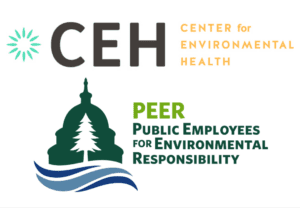Legal Action Filed to Halt Carcinogenic PFAS in Fluorinated Containers
FOR IMMEDIATE RELEASE
CONTACT
Kyla Bennett [PEER] [email protected], (508) 230-9933
Robert Sussman [CEH] [email protected], (202) 716-0118
Washington, DC — A new legal action seeks to force the U.S. Environmental Protection Agency (EPA) to stop the manufacture and distribution of hundreds of millions of plastic containers with dangerous levels of a carcinogenic per-and polyfluoroalkyl substance (PFAS) called perfluorooctanoic acid (PFOA). This Notice of Intent to Sue filed Friday by Public Employees for Environmental Responsibility (PEER) and the Center for Environmental Health (CEH) demonstrates that EPA has shirked its legal obligation to abate the serious and widespread risk to human health from PFOA as required under Section 4(f) of the Toxic Substances Control Act (TSCA).
This is the latest action to address toxic PFAS created by the fluorination process used by Inhance Technologies, LLC (Inhance) to impart barrier properties to plastic containers. Inhance fluorinates an estimated 200 million containers a year that are used for a wide array of products, such as cleaning products, chemicals, pesticides, personal care products, and fuels, as well as edible oils and flavorings. Alternative barrier technologies are available that do not create PFAS.
Section 4(f) of TSCA requires the EPA Administrator to act within 180 days of finding that there is a reasonable basis to conclude that a chemical substance presents a significant risk of serious or widespread harm to humans. The citizen groups’ Notice of Intent to Sue details how EPA has already concluded that PFOA is a human carcinogen with no safe level of ingestion and that it is present in the blood of 98% of U.S. residents. It also details how Inhance’s fluorination process creates high levels of PFOA that adhere to the plastic containers, leach into the products in those containers, and likely expose the workers and communities throughout the United States to carcinogenic PFOA.
“The presence of carcinogenic PFOA in tens of millions of plastic containers will cause serious and widespread harm to humans,” declared PEER Science Policy Director Kyla Bennett, a scientist and attorney formerly with EPA. “TSCA Section 4(f) requires EPA to act now to stop this dangerous and ongoing threat to human health.”
In December of 2023, EPA found the PFAS-laden containers constituted an unreasonable risk to public health and the environment and issued an order under section 5(f) of TSCA halting the practice immediately. However, in March, the U.S. Court of Appeals for the 5th Circuit vacated EPA’s order, finding that EPA relied on the wrong section of TSCA. EPA has declined to appeal that ruling and has failed to take any other action to enforce its finding of unreasonable risk.
Bob Sussman, attorney for CEH and former senior EPA official, said that “Congress included section 4(f) in TSCA to assure that EPA responds quickly and effectively to data showing serious or widespread risks to public health. EPA cannot simply walk away from the dire health threat of PFOA in plastic containers because of the 5th Circuit decision but is obligated by section 4(f) to address that threat under its other authorities.”
On May 17, PEER and CEH filed a voluntary notice of dismissal of its case against Inhance in the Eastern District of Pennsylvania after the United States took similar action three days earlier. While PEER and CEH are no longer pursuing their claims against Inhance in that forum, they are considering other options to hold Inhance accountable for its serious and continuing violations of EPA’s 2020 Significant New Use Rule for long-chain PFAS.
###
Read the Notice of Intent to Sue
Look at EPA rule that there is no safe level of PFOA for ingestion
